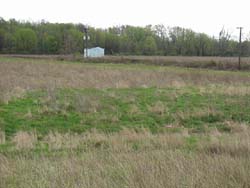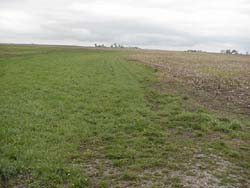|
Agriculture
is one of the best stewards of the land, since agriculture depends
on a productive land for its very survival.
Farm families are as close to the land as you can get.
Most live on land they work, and drink water from private
wells that are also located on that land. It is in the farm
family’s best interest to take good care of things.
One
of the key phrases that is used in agricultural and environmental
circles is “best management practices” or BMPs.
These BMPs simply mean that farming operations are carried
out in a manner that is also best for the environment. BMPs can
apply to anything related to agriculture, from water quality to pest
management.

[Wellhead protection from conservation reserve acres]
Many
conservation practices adopted by farmers fall into the BMP category
and improve environmental stewardship.
Some of these practices include crop rotation and fertilizer
application, chemical selection, conservation reserve programs and
tillage methods.

With
crop rotation, two or more crops are grown on the same piece of
ground in alternating years. Logan
County has mainly a corn and soybean rotation, in which corn is
grown the first year and soybeans are grown the next.
This rotation helps cut down on insect and disease problems
so that less pesticide is put into the environment.
In addition, soybeans produce nitrogen for the following corn
crop, reducing applications of fertilizer nitrogen.
Applications of fertilizers are also applied in the proper
manner and amounts.

[Strip cropping, providing contrast and conservation.]
The
use of chemicals in agricultural production is very widespread.
In fact it is a necessity to use crop production chemicals to
maintain current yields and quality factors.
Most acres are treated for weeds, but most aren’t treated
for insects or diseases now. Instead,
most producers check fields and apply chemical controls for insects
and diseases on an emergency basis.
The products used to control pests are more environmentally
friendly than their predecessors, since they are used in lesser
amounts, degrade faster and have far less adverse effect on
wildlife. Many
herbicides, used to control weeds, are now measured in ounces or
fractions of an ounce rather than pounds or gallons, as they were a
short time ago.
|

Conservation
practices, including tillage, are another major area in best
management practices. Contrary to the belief of some, farmers are great stewards of
the land. They have to
be, since their livelihood depends on the land.
Farms are usually passed down from generation to generation
as well, and no one wants to cheat a future generation.
Reductions in tillage leave more crop residue on the soil
surface to help prevent soil erosion and sedimentation of lakes and
streams.
Some
of the conservation practices in Logan County this past year include
reduced tillage, grassed waterway construction and maintenance,
construction of terraces, stream bank stabilization projects, and
removing sensitive ground from production.
Conservation tillage practices are used on over 80 percent of
the farm ground in Logan County each year.

[Grassed waterway and no-till
production, reducing soil erosion]
Farmers
are great stewards of the land and make “Earth Day” happen every
day.

Additional
note: An ongoing activity in the Earth Day spirit is offered by
the city of Lincoln and the Logan County Solid Waste Agency, with
wood chips available at the old city landfill Tuesday through
Saturday from 8 a.m. to 4 p.m. Bring your own container and you can
get chips suitable for landscape use or decomposed chips suitable
for compost. For very
large loads, you can contact the Lincoln Streets Department for
loading assistance (we’re talking grain truck loads and up here).
With the storms moving through the county, I’m sure there
will be some prime chips available.
[John
Fulton]
|



